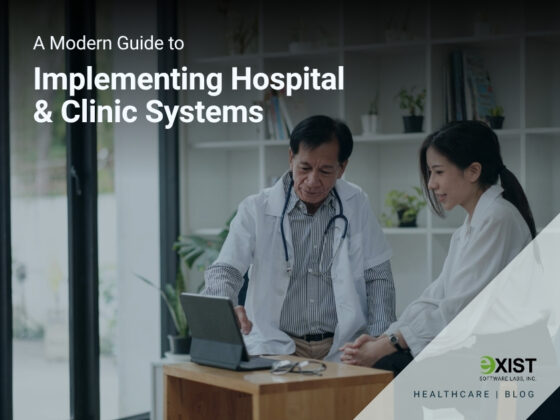The Philippines is making healthcare history. The Universal Health Care (UHC) Act isn’t just policy—it’s a digital revolution that demands every healthcare institution, from rural clinics to major medical centers, to modernize their technology infrastructure. But here’s the reality: without the right health information systems, this ambitious vision remains just that—a vision.
The good news? Modern healthcare technology can bridge this gap. By addressing three critical pillars—regulatory compliance, data interoperability, and operational efficiency—healthcare institutions can transform from isolated providers into connected partners in a nationwide health ecosystem.
Meeting the UHC Mandate: Compliance as Foundation

The UHC Act establishes a national eHealth framework that requires seamless, secure information flow between healthcare providers. This isn’t optional—it’s mandatory. Every health information system must meet strict data standards and validation processes set by the Department of Health (DOH) and the Philippine Health Insurance Corporation (PhilHealth).
Here’s what this means for healthcare institutions:
- Electronic claims processing must be accurate and timely
- Patient data must meet national security standards
- Reporting systems must integrate with government databases
- Documentation must be DOH-validated and PhilHealth-certified
Exist’s healthcare solutions are built for this reality. Our Medcurial Electronic Medical Records (EMR) and MERX Hospital Information System (HIS) are DOH-validated and PhilHealth-certified through successful client implementations. This certification ensures healthcare institutions can process patient claims electronically while maintaining the security and reliability required by law.
Breaking Down Data Silos: The Interoperability Challenge

One of the biggest obstacles to UHC implementation is fragmented health data. Patient information gets trapped in separate systems that can’t communicate with each other. This creates dangerous gaps in care and prevents the seamless information flow the UHC Act envisions.
The Cost of Poor Interoperability
When healthcare systems can’t share data effectively, the results include:
- Fragmented patient care across different providers
- Increased medical errors due to incomplete information
- Duplicate testing and unnecessary procedures
- Administrative inefficiencies that burden staff
The Solution: Global Standards, Local Expertise
Modern healthcare technology solves this through interoperability standards like HL7 and FHIR. Exist’s systems use these global open standards to seamlessly integrate with existing medical equipment, laboratory systems, and third-party clinical tools.
The result? A patient’s complete medical history follows them wherever they receive care—whether at a rural clinic or urban hospital. This connected ecosystem supports the government’s push for an integrated health information exchange while improving patient outcomes.
Connecting the Full Care Continuum

True universal healthcare extends beyond hospital walls. It requires technology that connects the entire ecosystem—from large medical centers to community clinics and outpatient facilities.
Exist addresses this need with comprehensive solutions:
- MERX Hospital Information System for enterprise-grade hospital operations
- Medcurial Clinic Management System (CMS) for smaller healthcare facilities
- Integrated EMR that seamlessly shares patient data across all levels of care
Real-World Success Story
A top private hospital in the Philippines demonstrates this integrated approach. Using Exist’s Medcurial clinic system and EMR for its occupational clinic hub, they created seamless connectivity to their larger hospital operations. A patient’s record created in the clinic becomes instantly accessible when hospital admission is needed, creating a unified and accurate patient history.
Modernizing Operations: From Paper to Digital Efficiency
Public hospitals in the Philippines face immense challenges: chronic understaffing, high patient volumes, and heavy administrative burdens from manual, paper-based systems. These pressures contribute to healthcare worker burnout and affect the quality of care delivered to patients.
The Technology Solution
 Migration to modern, cloud-optimized healthcare systems provides immediate relief by:
Migration to modern, cloud-optimized healthcare systems provides immediate relief by:
- Automating patient registration and scheduling processes
- Streamlining billing and discharge procedures
- Reducing paperwork that takes clinicians away from patient care
- Improving staff efficiency through web-based workflows
This isn’t just an IT upgrade—it’s a strategic investment in healthcare worker wellbeing and service quality. When administrative burdens decrease, clinical staff can focus on what matters most: patient care.
Proven in Practice
Chinese General Hospital and Medical Center became the first Philippine hospital to comprehensively adopt web-based technology and cloud infrastructure with Exist’s MERX HIS. This achievement demonstrates the scalability and reliability of modern healthcare technology solutions.
Looking Forward: Innovation as Strategic Advantage
Healthcare technology must evolve with changing needs. Exist’s solutions are designed with forward-looking features roadmaps that anticipate industry shifts. This ensures healthcare institutions can meet today’s compliance requirements while building scalable platforms for tomorrow’s innovations.
Our track record of executing complex, large-scale projects positions us as a strategic innovation partner—helping institutions not just maintain the status quo, but constantly evolve to lead Philippine healthcare’s digital transformation.
Building a Connected Healthcare Future
The Universal Health Care Act represents more than policy change—it’s a national commitment to healthcare equity through technology. Success requires more than good intentions; it demands proven solutions that combine:
- Deep regulatory compliance expertise for Philippine healthcare requirements
- Global interoperability standards like FHIR for seamless data exchange
- Modern cloud infrastructure for scalability and reliability
- Comprehensive support from the clinic to hospital operations
Exist offers this complete technology platform, helping both public and private healthcare institutions transform their operations and deliver better outcomes for every Filipino. This isn’t just a business opportunity—it’s our shared commitment to building a more connected, efficient, and equitable health system for the nation.
Implementing modern technology within the Universal Health Care (UHC) Act framework ultimately serves patients as the primary beneficiaries. By streamlining processes, enhancing data accuracy, and fostering seamless information exchange, modern health information systems lead to more efficient diagnoses, reduced medical errors, and personalized treatment plans. This technological advancement ensures that every Filipino receives timely, comprehensive, and connected care, transforming the ambitious vision of UHC into a tangible reality that directly improves health outcomes and the overall patient experience.
Ready to support the UHC Act with technology that works?
Learn how Exist’s DOH-validated and PhilHealth-certified healthcare solutions can help your institution meet compliance requirements while improving patient care.


